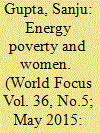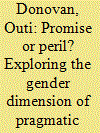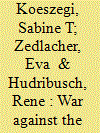| Srl | Item |
| 1 |
ID:
138400


|
|
|
|
|
| Summary/Abstract |
Access to clean, affordable, sustainable energy is thus an enabling factor for economic development and poverty reduction as well as for achievement of internationally agreed development goals, including ensuring environmental sustainability and promoting gender equality. At the same time, access to energy services can be argued to be a human right in itself.
|
|
|
|
|
|
|
|
|
|
|
|
|
|
|
|
| 2 |
ID:
189100


|
|
|
|
|
| Summary/Abstract |
International efforts to manage conflict, instability and war-to-peace transitions have undergone a change. Where ‘liberal peace’ once informed peacebuilding strategies, international agencies now frame their work with recourse to ‘sustaining peace’. This change signals a shift towards pragmatism in thinking about conflict and peace-making in the face of the limitations of liberal peace. What is notable in the move to pragmatic modes of peacebuilding is the emphasis on women as agents of peace. While gender-sensitive peacebuilding is not a new concept, the prominent role it plays in the pragmatic peace merits attention. Drawing on feminist pragmatism, I argue that pragmatic peace represents a significant opportunity for shifting peacebuilding practice towards more gender-equal and gender-sensitive modalities. Yet, an investigation into the gender dimension of pragmatic peace in post-Gaddafi Libya, implemented through empowerment programs, finds the promise unfulfilled. While such initiatives have had some successes in supporting women's collective action, capacity-building programs have not only failed to create meaningful opportunities for exercising agency, but have instrumentalized women's participation and reinforced existing patterns of inequality among women. The experiences of those to be empowered suggest that empowerment initiatives fall prey to the type of technocratic and de-politicizing peril that has characterized liberal peace interventions.
|
|
|
|
|
|
|
|
|
|
|
|
|
|
|
|
| 3 |
ID:
137619


|
|
|
|
|
| Summary/Abstract |
This study intends to analyze the relationship between military culture, masculine norms, attitude toward women, and workplace aggression. By using a paper-pencil survey in the Austrian Armed Forces, we show that overall 6.5 percent of all soldiers in the sample suffer from severe, long-term collective aggression (bullying). The detailed analysis suggests that systematic workplace aggression is associated with a culture with high power orientation and adherence to traditional (masculine) military norms. It occurs most often within socialization processes in training centers as well as in combat units. Conversely, culture in support units has high levels of task orientation with a comparably positive attitude toward female soldiers and less reported workplace aggression. The data reveal the gender dimension of workplace aggression in the Austrian Armed Forces: women are significantly more vulnerable to bullying. Almost every second soldier declares to have observed and every tenth soldier admits to have conducted aggressive acts against women.
|
|
|
|
|
|
|
|
|
|
|
|
|
|
|
|